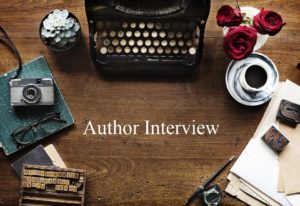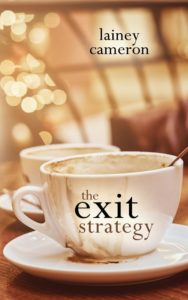An Interview with Lainey Cameron
 Anyone who is even lurking on the outskirts of the Women’s Fiction Writers Association has probably heard the name Lainey Cameron before. She’s an involved member of the group: she served as Head of Writing Workshops and then Vice President of Programs for the last three years. In 2020, she stepped back from the administrative side of things to launch her debut novel, The Exit Strategy (but is still very active as a member). Lainey is a digital nomad—meaning she picks locations around the world to live (and write) for months at a time—and believes community makes the author’s life worthwhile. Furthermore, she’s on a mission to obliterate the term aspiring writer. The woman is a marvel—so generous with her time, talent, and energy—it’s amazing she had the time to do this interview!
Anyone who is even lurking on the outskirts of the Women’s Fiction Writers Association has probably heard the name Lainey Cameron before. She’s an involved member of the group: she served as Head of Writing Workshops and then Vice President of Programs for the last three years. In 2020, she stepped back from the administrative side of things to launch her debut novel, The Exit Strategy (but is still very active as a member). Lainey is a digital nomad—meaning she picks locations around the world to live (and write) for months at a time—and believes community makes the author’s life worthwhile. Furthermore, she’s on a mission to obliterate the term aspiring writer. The woman is a marvel—so generous with her time, talent, and energy—it’s amazing she had the time to do this interview!
Christina: You come from a tech background. How did that background influence what you wrote about in your first novel?
Well, I’m indeed a recovering tech marketing executive, and a good part of my inspiration was a desire to share my personal experience of not-so-subtle sexism and how it feels to be the only woman in the boardroom. What I say in the author’s note is that, for credibility, I toned down quite a lot of the sexist incidents in the book.
The drama comes from the fact that my main character, Ryn, is an investor who has bet everything on the deal of her career. What she didn’t imagine is facing her husband’s mistress across the negotiating table. The question I wanted to pose is what would it take for us, as women, when plunged into that type of dilemma (being forced to work with your husband’s mistress), to rise above it and still work collaboratively?
Christina: The power of women working together seems to be a big theme in this book. Was that deliberate or where you started with it?
Yes and no. I started with an image of one scene: a wife picking up the phone and calling her husband’s mistress. At that point, I didn’t yet know the details of the characters (that one would be a CEO and the other an investor who had bet their career on her company), but I knew they’d be forced to work together.
The TV and movie stereotypes would say these two women would become their own worst enemies, fighting over the guy who dumped them into the situation. But I don’t believe in that reality. I wanted to take this book in a direction which ditches that ridiculous cliché because women I know and love are smarter than that.
And so yes, ultimately this is a book about female power and friendship. But that was more a reflection of my reality of being surrounded by smart, empathetic women than a deliberate “message” that I set out to get across.
Christina: On your website and in your bio, you say you’re “on a mission to obliterate the term aspiring writer.” Can you tell me more about that?
Sure! It’s possible that this is related to working in a male-centric world for so long, where I constantly had to prove myself. But a couple of years into the writing journey, I realized in the business world, at no time did I call myself an “aspiring” anything. At various points I was junior and learning my craft or “up and coming,” but I always claimed my titles with confidence because I was undertaking the job in front of me.
Using the term “aspiring” means not only you are not an expert at something, it means you aren’t yet capable. But if you are writing, you ARE a writer. Using “aspiring” feeds that banshee in your head that screams you don’t know how to do this, that you aren’t good enough.
And goodness knows the act of writing comes with enough doubt without using a term like “aspiring” to give it more fuel! I wrote a whole blog on the topic here.
Christina: Your Instagram feed shows that (outside of Covid) you post travel photos from around the world, yet your first novel is based where used to live, in Silicon Valley. Do you intend to keep writing about there?
Well, I started a second book based in Silicon Valley, all around the elastic versions of what constitutes truth and reality there, but after I worked with it for a while, it wasn’t singing to me. And then an idea jumped in my head and wouldn’t leave—so my second novel is actually inspired by my new life as a digital nomad, traveling and living in different locations.
I’m about 20,000 words into the story, which is about an adventure travel instagrammer living under a new name to hide her tragic past. Given her newfound fame, she fears her identity will be exposed, and she’ll have to face a history she’s fought valiantly to escape.
Along with that, I’ve been working on various marketing activities for The Exit Strategy, and I’m excited by the chance to talk with readers and book clubs. Please contact me if you’d like to invite me to yours!
Christina: You are deeply involved with Women’s Fiction Writers Association, and you published your debut with a small press. Any insights or advice from that to share with “up and coming” writers?
I’ve been blessed to have connected early with WFWA and received support from so many writers who are further in their careers.
On the writing side, my biggest advice is not to get so caught up in trying to get it “right” and listening to all the supposed “rules” of writing that you forget the most important; finding your own creativity and voice. From there, everything else can always be improved, but in the early days, it’s easy to become frozen with all the advice on what you shouldn’t do. We all have something unique thing to say—just keep putting words on the page until you determine what that is. Then you can refine how best to say it.
Publishing wise, my journey was challenging. After 130+ agent rejections, I learned a lot about perceptions of what is marketable—several agents and one publisher told me they didn’t see a readership for women’s fiction set in the workplace. But as women, most of us spend more than half our lives at work. So was I seriously being told that books about women’s lives can only be about motherhood or romance?
I’m lucky that through that community of supporters [WFWA] , I learned of many options today for getting my work into the world other than finding an agent—hybrid publishing, small publisher, self-publishing, and more. I encourage folks to understand each of those options before they decide what is right for them.
For me, after rejections and then choosing the small publisher path, to see 100+ reviews later that readers are calling the book “timely and provocative,” a “page-turner,” and “unputdownable” has warmed my soul. Luckily, my experience in the corporate world must have taught me not to take a no on one path for an answer!
Christina: How does traveling fuel your creativity and writing process? Has Covid and the lack of free traveling made an impact?
I had to think about this one (never been asked before!), but I believe travel fuels two essential skills for novel writing: curiosity and empathy.
When you are dealing in different languages and out of your cultural comfort zone, you must work to understand what drives someone and not take their behavior at face value. It’s especially important not to make assumptions based on your own cultural background. I wrote a blog post about this after Anthony Bourdain’s death, while I was living in Cartagena, Colombia, because I admired this in him. He looked below the stereotypes to find the universality in what we care about as humans across cultural backgrounds: love, health, family, fulfillment.
It’s similar with a character in a novel; to help the reader relate, you need to seek the universality of what drives them beyond the first, most obvious assumption of why they behave a certain way. You need to find empathy for their needs and desires, so you can effectively tell their story.
For Covid, I’ve been lucky so far. After almost getting trapped in Europe when the borders closed in March, I made it back to Mexico, and my hubby and I have been isolating in our house in San Miguel de Allende. But I say lucky, because I can write from my home, and he works remotely too. With modern technology, we’ve been able to stay in touch with relatives, and I’m engaged with several online writer groups (including a new writer support group on a Thursday night that Charlotte Dune and I kicked off because of writers feeling isolated during the pandemic). Not everyone can support themselves without leaving the house every day, so I consider us very fortunate and privileged right now.

Two very important items before we close:
- Lainey’s award-winning debut novel, The Exit Strategy, which has been called a “rallying call for women to believe in themselves and join together,” is on temporary sale for $0.99 or the equivalent (for Kindle format) around the world!
- Lainey has also put together a Mask Share Challenge. For every photo of The Exit Strategy (and as Lainey says, “even better with a mask”) shared on social media, Lainey will donate to her local mask charity. For more information, read about it here.
Thanks to Lainey for agreeing to this interview! If you know of an author who’d like to be featured in an interview (or you are an author who would like to be featured), feel free to leave a comment or email me via my contact page.

Thanks for introducing me to this writer. I love her pro-feminist aspect and her travel lifestyle (pre-Covid). Goals!
Thanks for the interview. Going to add this book to my to-read pile!
Sounds like a plan! Hope you enjoy it.